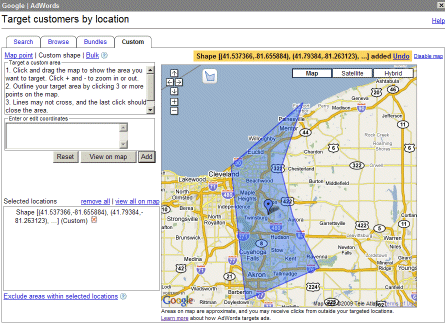 Four Words to Shake Radio Industry
Four Words to Shake Radio Industry
|
 |
"Local Advertising on Pandora" is not exactly a phrase you want to acknowledge, and my guess is it won't be by many of broadcast radio's elite troops. Just keep your eyes on this concept, though, because it's about to turn many radio industry executives into the "F Troop" of audio ad sales.
Local internet radio advertising is not a new concept. It has been around for over eight years, but barely. Until now there hasn't been a single service that could deliver a mass audience large enough to make buying geo-targeted online radio efficient. Pandora's announcement refers to delivery of banner advertising, but geo-targeted audio advertising by other companies is very close to gaining a deserved limelight.
The closest the broadcast industry came to having local businesses use the internet for audio advertising (and I am not referring to repurposing on-air ads to online) was with Google Audio AdWords. You can only describe the acceptance of this idea as "cool." In the untethered, independent internet radio community, the organized support needed to make local online audio advertising a reality hasn't been around until now.
Pandora's announcement of placing the smaller "local" advertiser in the crosshairs is a game changer, and for a reason radio industry executives may wish to overlook: "The move comes in response not to a deflated ad market, said Pandora's VP of performance ad sales Brian Mikalis, but to a swell of inquiries from local advertisers that were taxing Pandora's national sales staff." Advertisers are asking for it, so Pandora coupled with AdReady to deliver a do-it-yourself ad platform that helps smaller advertisers place display ads with publishers.
Here's something else to widen your eyes. While this new Pandora offer appears limited to banner advertising, it is not the only internet radio network with the ability to place local advertising - banner or audio. Pandora just has the biggest drum.
TargetSpot, Ando Media, and Live365 are the next three largest networks having conversations about placing radio advertising - as in "audio ads" - in designated markets and even more specific locations within a market. Here is a simple look at how Google AdWords defines delivery. It is very close to how all geo-targeting is delivered for internet radio, be it banners for Pandora or audio ads on Live365, TargetSpot, etc.

The above shows how a Google advertiser may select to have their ads delivered only to those accessing the internet from the area marked in blue. Bringing this back to Pandora, if a listener is on the East side of Cleveland, they will see the banner ad. If the listener is on Cleveland's West side, they won't. In technical terms, this is "straight-forward, easy stuff."
Is it worth running from, though? Or is this another call to terrestrial broadcasters that the transition is in full swing, and they had better begin finding ways to use the internet for clients? It's obvious the internet is of interest to radio advertisers. Just how will radio respond?
Nearly everyone controlling radio must step away from the forest for this view; it is that dramatic. Move outside of your comfort zone.
I'm not able to remember which radio trade it was that recently carried a story about 60% of radio account executives feeling comfortable selling online inventory, but it was a jaw-dropping statistic for me. Being deeply involved in the analytics & metrics of internet advertising, I'm finding it hard to grasp that any broadcast radio account executive truly understands all the minutiae that surround advertising online. User counts, response rates, landing page adjustments, analytics programs, funnelling, A/B Testing, and more are all part of this scene, which is not usually made available to a radio sales staff. There is too much to know, and no track record of radio initiatives to teach these disciplines. (Let's not go into RAB Certification.)
What all companies that offer geo-targeted internet radio advertising placement have done is spend the past years studying all of the elements that make advertising online more efficient. I equate knowing how to use the internet for advertising with playing a musical instrument. Practice. Practice. Practice. Unless you have in-field experience you simply cannot fathom the depths of analysis we can reach by using a variety of numbers against ads served. Geo-targeting of online streams is a threat to radio's traditional business model since it produces reams of data not found on any local station's affidavit of performance, and it can be easily used by regional ad buyers.
Now that we have local advertising coming to Pandora, the word will get out.
Meanwhile, other services that offer geo-targeted online radio advertising are starting to slowly increase business. How, you ask? Do a little research. See the low CPM rates these online advertisers are paying. It's one more reason broadcast radio's elite troops don't acknowledge that geo-targeting is being used by independent online radio networks - and maybe they won't, until the radio industry is shaken a little harder.
 |
From: Mary Beth Garber
So Ca Broadcasters Assn
Los Angeles
Any radio broadcaster who doesn't understand that the internet is the savior of radio doesn't understand their own product.
|
 |

|
 |
|


 About
About


 Contact
Contact


 Indie Artists
Indie Artists


 Radio Stations
Radio Stations


 Audience Data
Audience Data


 Privacy
Privacy



|
|
 |
|
 |
 |